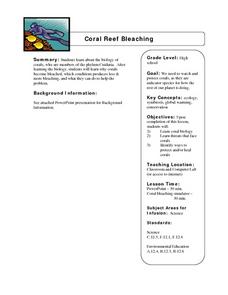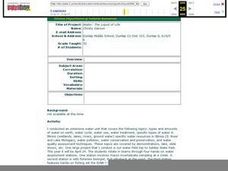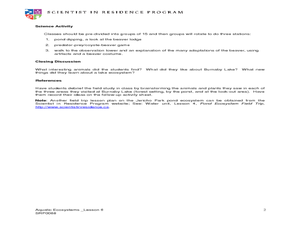Curated OER
Barnacles: Harder than Cement
Fourth graders watch the movements of the complex animal hidden inside the tiny barnacle shells. This lesson allows students to study the behavior, adaptation, and larval stage of the barnacle.
Curated OER
Plover Survival: A Simulation Game
Seventh graders engage in a simulation that explains the feeding behavior of the piping plover and the things that disturb the feeding and nesting of this species.
Curated OER
Tackling Taxonomy
Students study physical characteristics of separate phyla and place them into similar groups. This lesson is part of a multi-segmented unit on the diversity of life. students develop a classification system by grouping animals into...
Curated OER
Urban Impact on Chollas Creek (California): A Field Study
Students, in groups, take samples from a creek and keep a field journal on their samples. They also perform tests on their samples.
Curated OER
Are You Related?
Students study microsatellite markers and explain how they might be used to identify populations. They use data to make inferences about the populations of deep-sea corals.
Curated OER
Meadow Study
Young scholars examine insects they collect in a sweep nets. They identify as many of the insects as they can.
Curated OER
Introduction to Paleontology Lab
Students engage in a lab which introduces them to fossils and paleontology. They examine eleven numbered boxes containing fossils which are related to the questions on this lab then answer questions on a lab sheet imbedded in this plan.
Curated OER
Animal clues
Fifth graders use general knowledge to make educated guesses about the habitat and survival strategies of animals from Australia, Antarctica and Africa. They research to confirm and check ideas and group animals in a variety of ways.
Curated OER
"For the Birds" [part I]
Students identify birds that appear in Chinese and Japanese art, learning about
their physical characteristics, classifying them according to scientific principles, and exploring their habitats and migration patterns. This is part one...
Curated OER
Ocean Market
Young scholars research how: The ocean is the source of many materials, from ores mined from its depths to relaxing mineral salts for a bath. Exquisite mother-of-pearl inlay, decorative shells, and pearl jewelry are found in gift shops...
Curated OER
Water,It's Special
Students describe the three forms of water. Students list reasons why water is necessary. Students access the Internet to complete Prediction lab report worksheets and FCAT-Style Questions worksheets.
Curated OER
Coral Reef Bleaching
Pupils explore the structural biology of corals. Working individually, students identify how corals become bleached and which conditions produce more and less coral bleaching. Pupils explore how this effects the environment and give...
Curated OER
Water: The Liquid of Life
Sixth graders complete a activity on the properties, types and amounts of water on Earth. In groups, they travel between stations to identify water resources in Illinois and pollution sources. They complete the activity with a field...
Curated OER
Build A "Bug"
Young scholars brainstorm different adaptations that bug would need to live in aquatic environment, and watch presentation where classmate is dressed up in costume to represent adaptations necessary for macroinvertebrate to survive in...
Curated OER
Dissolved Oxygen Lesson
Pupils investigate what dissolved oxygen is and why it is important to aquatic life and what factors influence levels of dissolved oxygen in a lake. They study how to use MS Excel to make charts to show trends and correlations.
Curated OER
De"compost"ition Activity
Pupils investigate the decomposition process and the parameters which influence the rate at which it occurs. They design a "controlled" experiment by comparing decomposition rates between two compost piles. Analysis questions include...
Curated OER
Tucson Children's Museum Dino Crossword
In this crossword puzzle, students complete a crossword puzzle related to dinosaurs, the era in which dinosaurs lived, and about other animals that lived during that time period.
Curated OER
Oddball Out: Animals
In this problem solving worksheet, students analyze a row of pictures
of various animals to determine which creature is different from
the others pictured.
Curated OER
Amphipods
Young scholars identify organisms that live at the bottom of the body of water. In this biology lesson, students evaluate the effects of pollution to amphipods population. They examine collected data and create a bar graph comparing them.
Curated OER
Burnaby Lake Field Trip
Students identify different organisms found in the lake ecosystem. In this life science lesson, students discover the predator-prey relationship through a game. They explain how beavers adapt to the environment over time.
Curated OER
Pheed the World: Edible Phyla
High schoolers discuss the contributions of different organisms to our world. In this biology lesson, students research countries with limited food supply. They create an improvement plan for a fictitious country assigned to them.
Other popular searches
- Invertebrates and Vertebrates
- Marine Invertebrates
- Invertebrates Vertebrates
- Vertebrates an Invertebrates
- Vertebrate and Invertebrates
- Benthic Invertebrates
- Invertebrates Research
- Invertebrates + Vertebrates
- Macro Invertebrates
- Estuary Invertebrates
- Macro Invertebrates
- Bentham Invertebrates



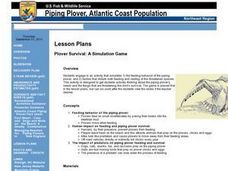






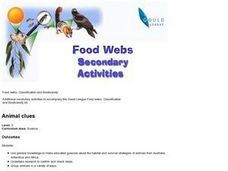
!["For the Birds" [part I] Lesson Plan "For the Birds" [part I] Lesson Plan](http://content.lessonplanet.com/resources/thumbnails/122462/large/cgrmlwnvbnzlcnqymdeymtaxny0ynji5lwd4n2h5by5qcgc.jpg?1414222903)


